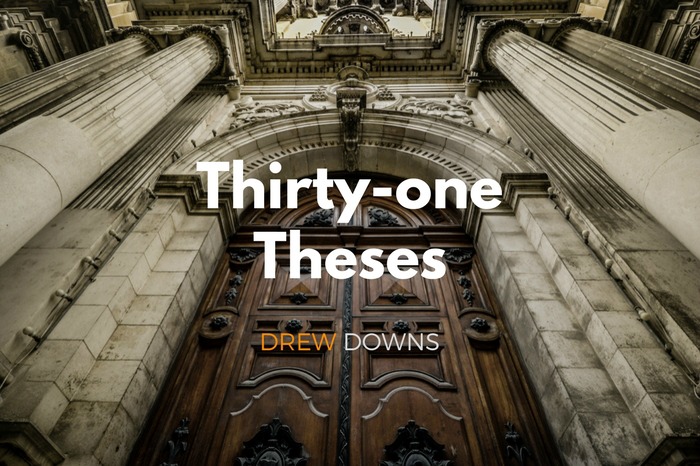On October 31, 1517, Martin Luther nailed a series of arguments on a door. It is understood to be the flash point of the Great Reformation.
These arguments, known as The Ninety-five Theses, concerned Luther’s rejection of the church’s use of indulgences on theological grounds. Of course, there’s more there than that. Just like the there was reforming going on before they were written.
This, of course, is the beauty of history. That a moment can be greater than the sum of its parts. It can also be over-filled with fascination.
Luther was no revolutionary. Nor was he seeking to spark a revolution. His was merely a stand against a church practice which expressed a weakness in theology and abuse of power. In some ways, such a thing is purely normal.
My Theses
This series of brief writings will form a collection of theses around a common theme. Don’t worry, it isn’t indulgences.
But these theses, arguments, are ones I believe in strongly and express my own outrage at a weak theology and abuse of power.
Only, a few things have changed over the past five centuries.
While Luther’s criticism is leveled against the Roman Catholic Church, my own is against Roman Catholicism and Protestantism. In this way, it is a weakness found in most of what we call “Western” Christianity.
My hope is that we notice that in our previous reforming of the church, we have failed to deal with historic problems, and in some ways, have amplified them and made them worse.
Please consider these theses as an earnest homage with the humblest of ambitions to clarify and educate.
The Thirty-one Theses
In the desire and with the purpose of making the truth clear, a setting forth of theses will be held on the propositions shown below at this website, under the presidency of the Reverend Andrew Downs, priest of the Episcopal Church, Master of Divinity, and ordinary writer of the same in that place. In the name of our Lord Jesus Christ. Amen.
2. In the word “with” we have the ultimate expression of Christian community, concern, and faith.
3. For in Jesus, taking a human form and raised from the fragility of birth, God came to be with us.
4. God promised to be with the Hebrew people in liberation from Egypt and desert wandering.
5. Even the name given to Moses expresses “withness” saying I will be there howsoever I will be.
6. Through all the great upheavals in history, God has been with the people.
7. But in Jesus, we are given human responsibility to create withness with one another.
8. When we feed the multitudes, welcome the stranger, and heal the sick, we are also with Jesus.
9. But in the arrogance of Christian piety and Western intellectualism we seek isolation.
10. Our individual pursuit of the divine leads us away from community.
11. And our communities have driven the divine into individual pursuits.
12. Reformers sought to end the arrogance of Catholicism with the arrogance of individualism.
13. The indulgences Luther despised were no more dangerous to souls than elevating faith alone.
14. God cares no more for the true acts of piety than the empty if no one is made free.
15. Nor is freedom from people anything but a prison of isolation.
16. The unembodied faith of the mind is a prison, ensnaring the souls of all people, even God!
17. By faith alone imprisons a God of redemption without transformation or enfleshed mission.
18. For God’s greatest activity is in the form of community, as small as twos and threes.
19. And it is through these groupings we come to embody the love of Christ in ourselves.
20. In taking on the form of Christ, we are making God present again and with the people.
21. Therefore the pastor doesn’t “with” love in excluding his LGBTQ brothers and sisters.
22. Nor does the pastor embody Jesus in the forced recitation of words, empty or well-meant.
24. Christians should be taught that belief unused is unbelief and a damning of God’s generous mercy.
25. Christians should be taught that faith is both an internal and external commitment to love.
26. Christians should be taught to share supportive love generously while restricting selfishness.
27. Christians should be taught to love our creation and common space more than their own homes.
28. To repress our common need for the sake of personal piety is no lesser a sin of power when reformed.
29.To fulfill the missio dei, Catholics and Protestants must repent of their common sin to power.
30. And then all people of faith could put themselves and one another in the mercy of God.
31. We could with common voice, spirit, and heart, embody the love embodied in Jesus.
Some additional writings
The sermon I preached at the tail end, dealing with the exact same material: Love Against the Wind.
A further reflection on: The Greatest Commandment.
Want to keep reading about love?
The 31 Days of Theses may be over, but the journey continues! Just sign up for The Drewsletter and you’ll get new pieces soon after they are published. You’ll also get the semi-regular email newsletter. Feel free to unsubscribe at any time!
Media




